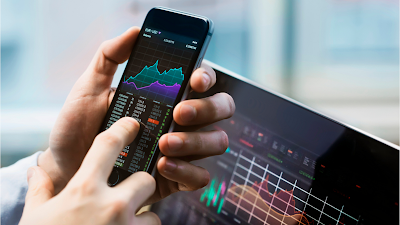The Power and Potential of Online Trading: A Comprehensive Guide
Introduction
Online trading has revolutionized the way individuals and businesses participate in financial markets. Gone are the days when trading stocks, currencies, or commodities required a physical presence on a trading floor. With the advent of the internet, anyone with a computer or smartphone and an internet connection can engage in online trading from the comfort of their home or office. In this comprehensive guide, we will explore the world of online trading, its benefits, risks, and how to get started.
The Basics of Online Trading
Online trading refers to the process of buying and selling financial assets through online platforms provided by brokers. These assets can include stocks, bonds, currencies (forex), commodities, cryptocurrencies, and more. The core principle of online trading is to profit from the price fluctuations of these assets.
Key Components of Online Trading:
1.Online Brokerage Accounts: To begin online trading, you need to open an account with an online brokerage firm. These platforms provide you with access to various financial markets and tools to execute trades.
2.Trading Platforms: Most online brokers offer trading platforms, which are software interfaces that allow you to place orders, analyze market data, and manage your portfolio. These platforms can be web-based, desktop, or mobile applications.
3.Market Analysis: Successful trading often requires a thorough understanding of market analysis. There are two main approaches: fundamental analysis (examining the financial health of an asset) and technical analysis (studying price charts and patterns).
4.Risk Management: Online trading can be volatile and risky. Effective risk management strategies, such as setting stop-loss orders and diversifying your portfolio, are crucial to protect your investments.
Benefits of Online Trading
1.Accessibility: Online trading is accessible to anyone with an internet connection, allowing individuals from around the world to participate in global markets.
2.Cost-Efficiency: Online trading typically involves lower fees and commissions compared to traditional brokerage services.
3.Real-Time Data: Traders have access to real-time market data, enabling quick decision-making.
4.Diversification: Online trading allows you to diversify your investments across various asset classes and markets, reducing overall risk.
5.Flexibility: You can trade at any time of the day or night, fitting trading around your schedule.
6.Educational Resources: Many online brokers offer educational materials, webinars, and demo accounts to help traders improve their skills.
Risks of Online Trading
While online trading offers numerous benefits, it also comes with inherent risks:
1.Market Risk: Prices of financial assets can be highly volatile and subject to rapid fluctuations.
2.Lack of Experience: Inexperienced traders may make costly mistakes, especially in highly leveraged markets like forex or derivatives.
3.Overtrading: Emotional impulses can lead to excessive trading, resulting in losses.
4.Security Concerns: Online trading platforms must be secure to protect your personal and financial information from cyber threats.
Getting Started with Online Trading
1.Education: Start by learning the basics of trading through books, online courses, or educational resources provided by your chosen broker.
2.Select a Reputable Broker: Choose a well-established and regulated online broker that suits your trading needs.
3.Create an Account: Open a trading account and complete the necessary identity verification.
4.Fund Your Account: Deposit funds into your trading account.
5.Practice: Use a demo account to practice trading without risking real money.
6.Develop a Strategy: Create a trading strategy based on your risk tolerance and goals.
7.Start Trading: Begin trading with small positions and gradually increase your exposure as you gain experience.
Conclusion
Online trading has democratized financial markets, giving individuals the opportunity to participate in various asset classes and potentially grow their wealth. However, it's essential to approach online trading with caution, using a well-thought-out strategy and proper risk management. With the right education and discipline, online trading can be a rewarding endeavor for those willing to put in the time and effort to master it.











No comments